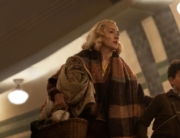In a lot of ways, My Name is Sara is an espionage film: a young woman fervently commits to maintaining a new identity because that alias is all that stands between life and death. Such decisions were crucial for Jews who hid in plain sight during the Holocaust, both for their own protection and those who hid them. This is felt in the movie’s haunting atmosphere, where 13-year-old Sara Goralnik’s fortitude to keep this cover going, no matter what, is constantly tested.
The real-life Sara Goralnik (later Sara Shapiro), a Polish Jew who disguised herself for two years as an Orthodox Christian, did indeed survive. She passed away in 2018, having moved to the United States after World War II and raising a family of her own. But in 1942, Sara (Zuzanna Surowy) was merely a young girl displaced, sent away from the Korets ghetto with her brother Moishe by their parents before its liquidation. For a time, all they can do is keep running in hopes that a Nazi patrol won’t find them. However, the difference between the siblings lies in appearances: Sara can pose as a Christian, while Moishe, due to his looks, cannot. So, she makes the painful decision to leave her brother behind, taking on the name of former schoolfriend, Manya Romanchuk, and with it the identity of a Christian runaway.
The backstory Sara creates for Manya is convincing enough to put her in the service of a local Ukrainian family: rugged farmer Pavlo (Eryk Lubos), his mistrustful wife Nadya (Michalina Olszanska), and their two boys. Though the kids quickly take to her, neither adult show the same eagerness, given the anti-Semitic suspicions of the time. Their main priority is to tend the farm and meet the demanding crops quota enforced by the occupying SS troops. If there’s real suspicion placed on Sara it’s because she’s young and beautiful, based on Nadya’s glowering stares when the teenager and Pavlo are together. Nadya suspects the worst, all while ironically relying on Sara’s confidentiality when Nadya’s secrets come to light.
The fast-paced and suspenseful My Name is Sara is shot simplistically, yet always feels tense. Director Steven Oritt—in his feature film debut—makes the story one of contradictions as well as secrets. Pavlo and Nadya don’t trust Sara, but they ultimately become dependent on her companionship. Sara’s visit to the nearby town constantly puts her in danger’s frontlines, be it from the SS guards or an older woman who could verify whether “Manya” is actually from Korets. The Ukrainians are squeezed of livestock by Nazis, but feel a greater hatred toward Jews. All parties hurt each other, even as their commitment to some semblance of mundanity allows a greater evil to play out unseen.
Throughout it all Sara perseveres, no matter how much you expect her façade to crack. It doesn’t. Not to another Jewish girl who asks for food, despite Sara’s attempts to help her pose as Christian. Not to the village priest who deduces Sara’s hiding a secret, or the gang of Russian partisans who have a Jewish member in their ranks. Covertly retaining Judaism is always tied to the threat of death, as evident by a flashback: Sara makes a promise to her mother that she will recite the Shema prayer should her final moments near. My Name is Sara makes you feel this push-pull of attachment, always living in the moment with Sara but at arm’s length. Though she has compassion for those around her, she never truly opening up lest too many people be implicated in her survival.
In her debut acting role, Zuzanna Surowy is a fitting choice as Sara. Much like how the Ukrainian villagers never suspect her true persona, viewers might be shocked to learn that this is her first film. Surowy acts as much through gazes as she does words, observing her surroundings and finding the response that make Sara’s presence as inconspicuous as possible.
My Name is Sara offers both a strong directorial outing and character study, a tale of retaining one’s self in a world so callously opposed to its existence. Though small-scale, it paints a larger picture of how everyone was oppressed by the Nazis’ rule, and also how the Ukrainian countryfolk’s own flaws unwittingly helped the Holocaust spread unchallenged. For Sara Goralnik, enduring this was no easy feat, but by doing so, she pulled off a revenge plot right under the Third Reich’s noses: outliving their hatred. All with her Judaism intact.







Leave A Comment